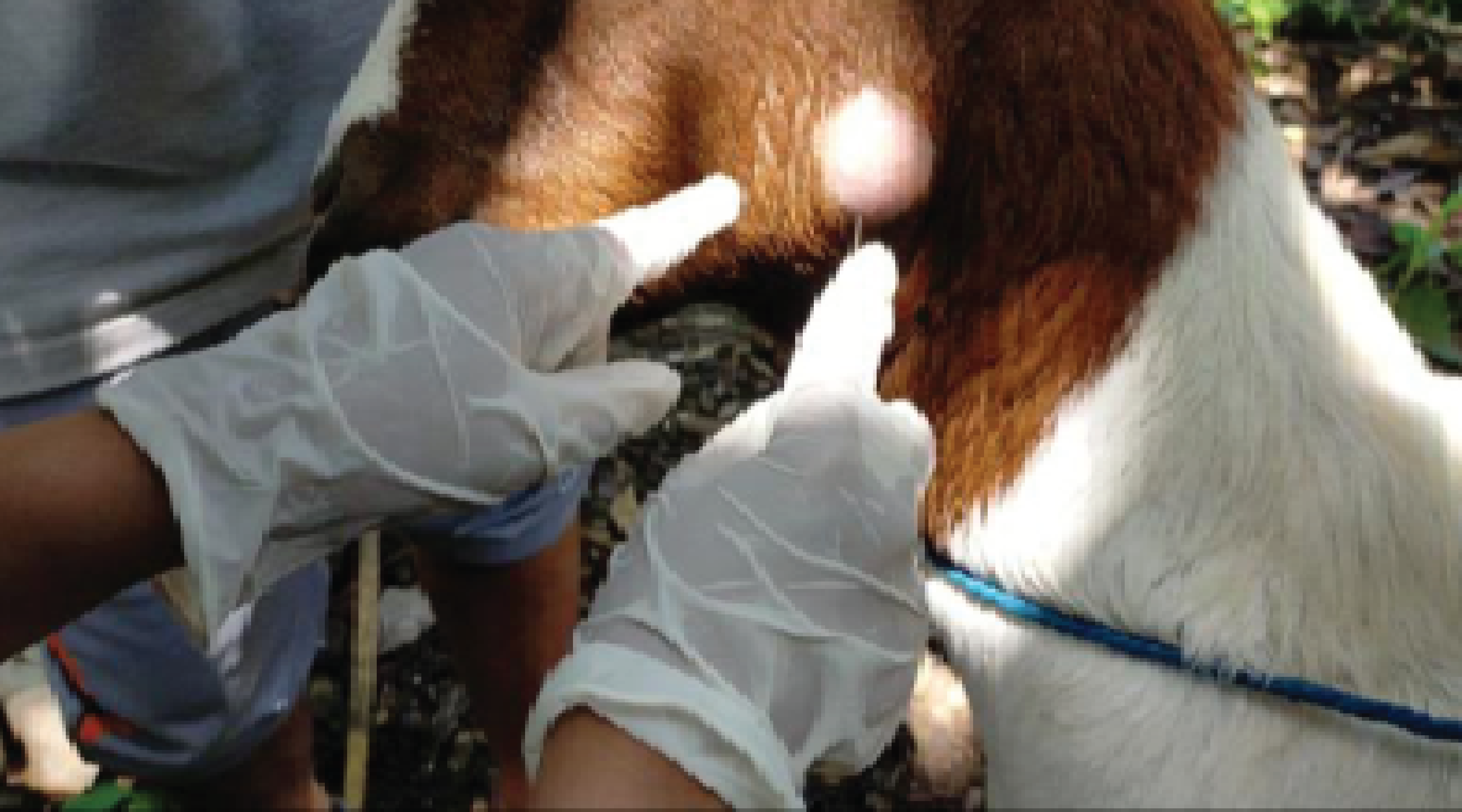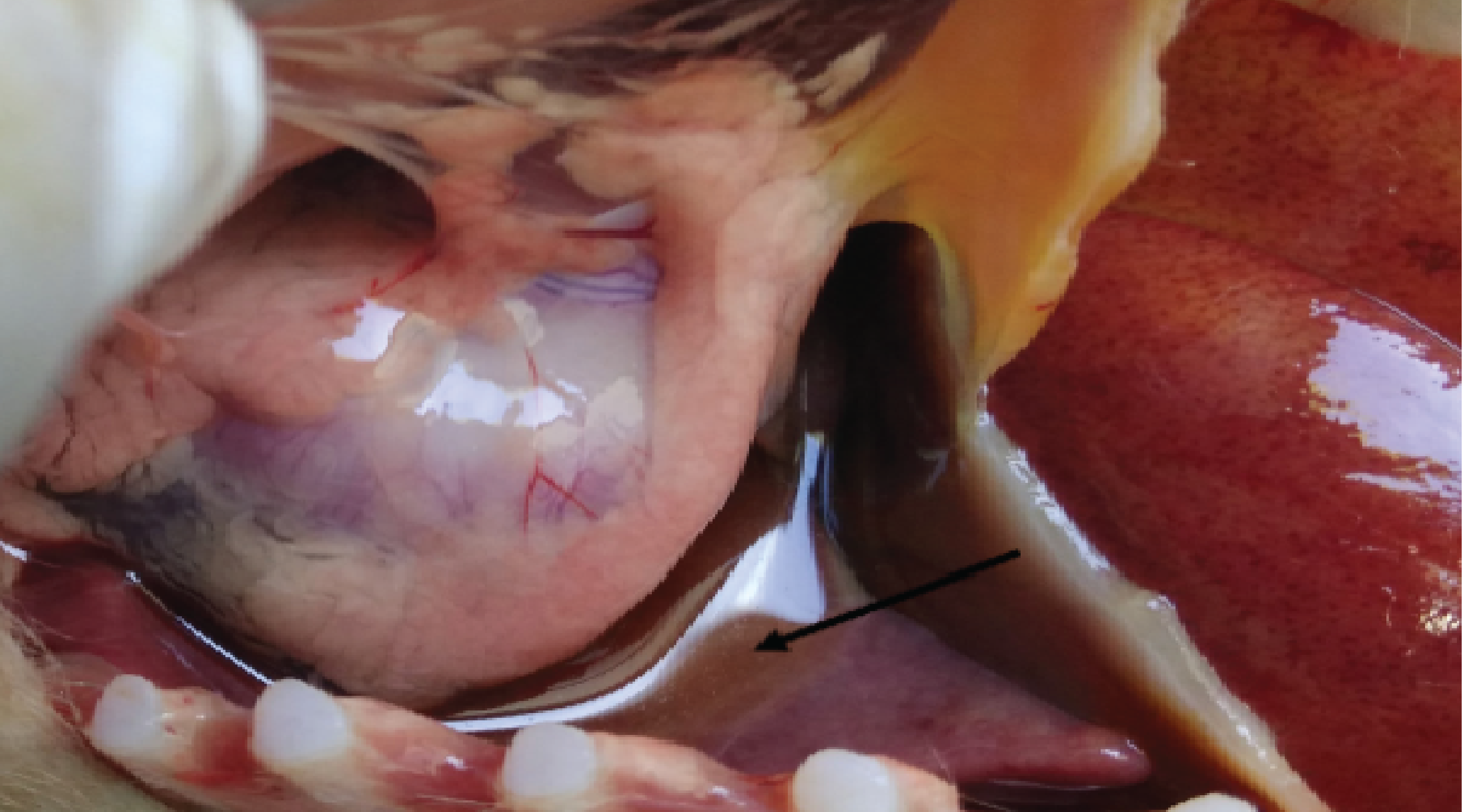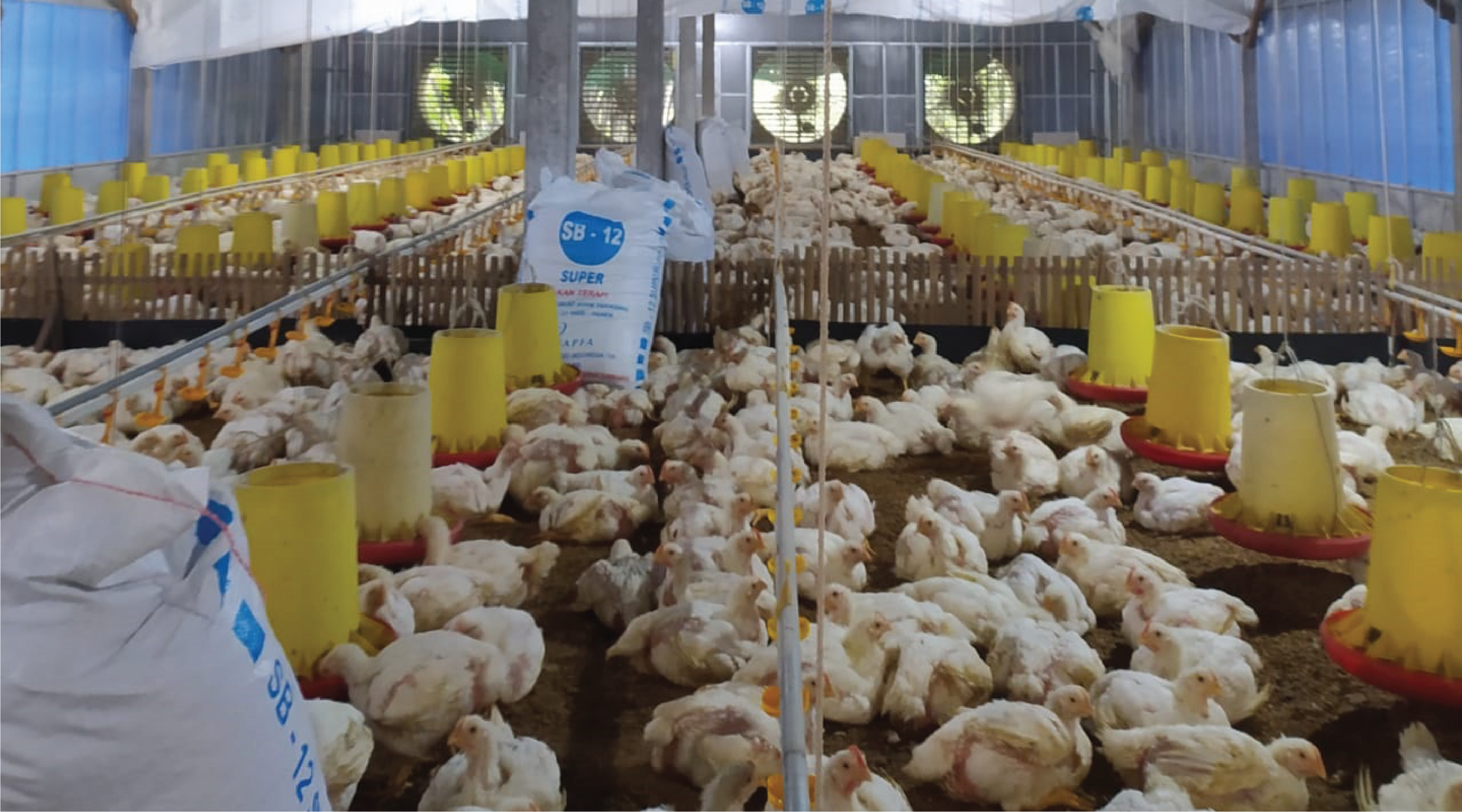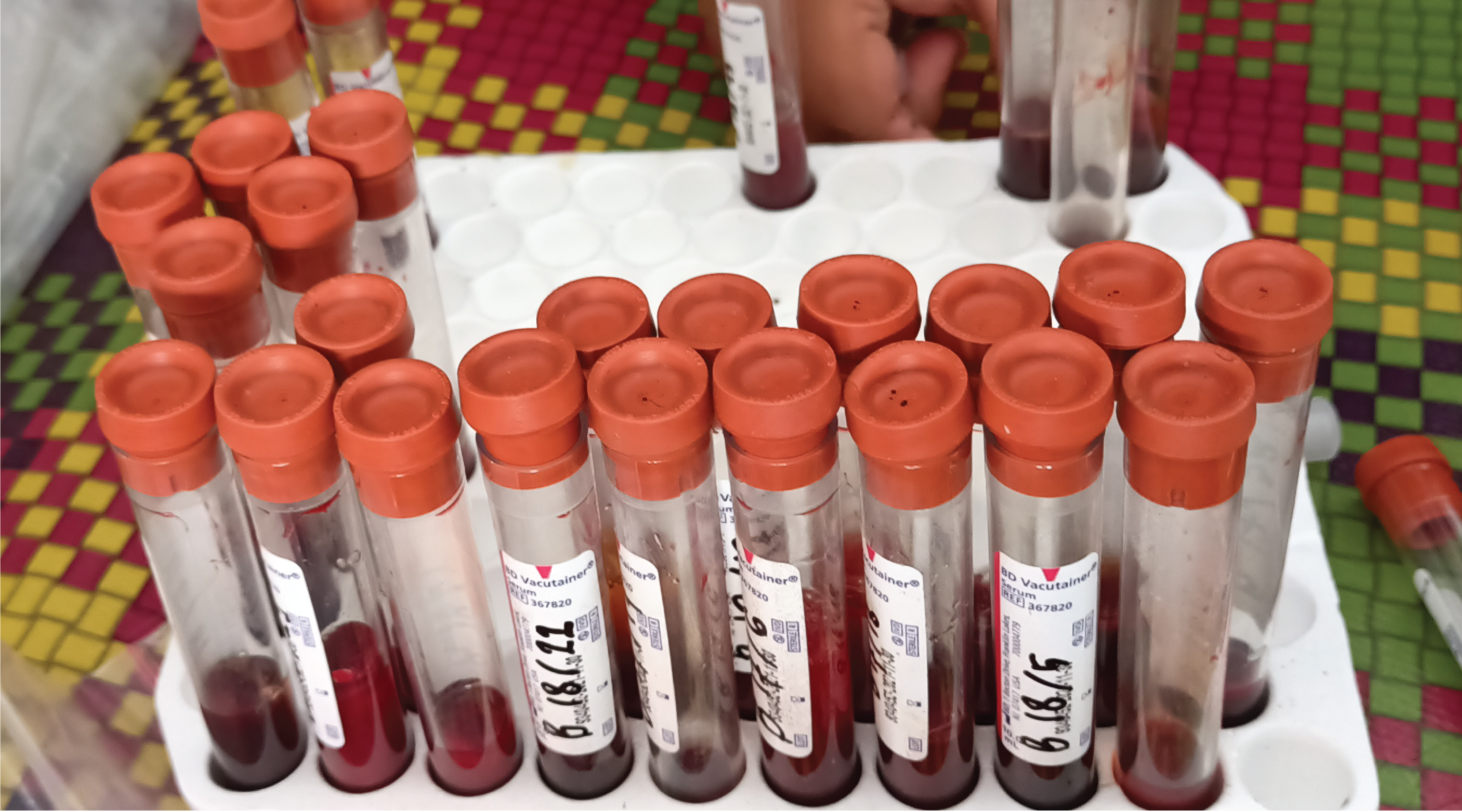Canine Parvoviral Enteritis in a Five Month Old Golden Retriever
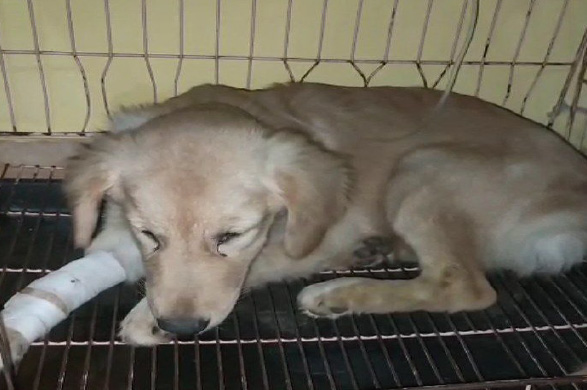
Downloads
Background: Canine parvovirus (CPV) is a major cause of severe illness in dogs, particularly in unvaccinated puppies. The virus spreads rapidly and often leads to acute gastrointestinal disease with high morbidity and mortality. Purpose: This case report describes the diagnosis and management of canine parvoviral enteritis in a young dog that presented with early clinical signs of infection. Case(s): A five-month-old female Golden Retriever named Golden, weighing 7.65 kg and light brown in color, was presented with a two-day history of anorexia, repeated vomiting (approximately five times per day), and bloody diarrhea. On physical examination, the patient was moderately dehydrated, with pale mucous membranes, delayed capillary refill time (>2 seconds), reduced skin turgor, and elevated heart and respiratory rates. Fecal examination revealed no intestinal parasites. Hematological analysis showed normocytic normochromic anemia, lymphocytosis, neutropenia, and thrombocytopenia. A rapid CPV antigen test confirmed the diagnosis of parvoviral infection. Based on the clinical and laboratory findings, the dog was diagnosed with canine parvoviral enteritis. Case Management: Treatment focused on supportive and symptomatic care. Cefotaxime (20 mg/kg body weight) was administered intravenously twice daily for five days to prevent secondary bacterial infection. To control vomiting, metoclopramide HCl (0.5 mg/kg body weight) was given intravenously. Supportive therapy included intravenous fluids (lactated Ringer’s solution) and vitamin B-complex supplementation. Conclusion: The patient showed marked clinical improvement, including normalization of vital parameters, restoration of appetite and activity, and cessation of vomiting and diarrhea. The dog was considered clinically recovered at the end of the treatment period.
Dash, S., Das, M., Senapati, S., Patra, R., Behera, P., and Sathapathy, S., 2020. Effect of Therapeutic Regimen on The Survivility and Mortality Rates in Canine Parvovirus Infection. Journal of Entomology and Zoology Studies, 8, 392–395.
Gallagher, A., 2025. Canine Parvovirus Infection (Parvoviral Enteritis in Dogs). MSD MANUAL Veterinary Manual.
Ikejiofor, O.K., Boniface, A.M., Nweze, N.E., Danladi, M., and Ochai, S., 2017. Canine Parvovirus: A Review. International Journal of Science and Applied Research, 2, 74–95.
Khare, D.S., Gupta, D.K., Shukla, P.C., Das, G., Meena, N.S., and Khare, R., 2020. Clinical and Haemato-Biochemical Changes in Canine Parvovirus Infection. Journal of Pharmacognosy and Phytochemistry, 9, 1601–1604.
Lubis, B.S., Soma, I.G., and Suartha, I.N., 2023. Laporan Kasus: Infeksi Canine Parvovirus Tipe Enteritis Pada Anak Anjing Kacang dengan Induk yang Divaksinasi Lengkap. Indonesia Medicus Veterinus, 12(1), 42–54.
Miranda, C., and Thompson, G., 2016. Canine Parvovirus: The Worldwide Occurrence of Antigenic Variants. Journal of General Virology, 97, 2043–2057.
Mylonakis, M., Kalli, I., and Rallis, T., 2016. Canine Parvoviral Enteritis: An Update on The Clinical Diagnosis, Treatment, and Prevention. Veterinary Medicine: Research and Reports Volume, 7, 91–100.
Odueko, F.D., 2019. Case Report of Canine Parvoviral Enteritis in 12Weeks Old Rottweiler Female Puppy. Journal of Dairy, Veterinary & Animal Research, 8, 216–223.
Oleiwi, K., Hussein, M., Fahad, O., and Abdulrazzaq, S., 2025. Infection Rate of Canine Parvovirus in Dogs Presented at Private Veterinary Clinics in Baghdad City. Open Veterinary Journal, 15(1), 395–401.
Pardo, M., Spencer, E., Odunayo, A., Ramirez, M.L., Rudloff, E., Shafford, H., Weil, A., and Wolff, E., 2024. 2024 AAHA Fluid Therapy Guidelines for Dogs and Cats. Journal of The American Animal Hospital Association, 60, 131–163.
Poudel, U., Dahal, U., and Aryal, A., 2020. Canine Parvovirus Infection in Young German Shepherd Dog: A Case Report. International Journal of Scientific and Research Publications (IJSRP), 10, p9980.
Purwitasari, M.S., Soma, I.G., and Batan, I.W., 2022. Laporan Kasus: Kesembuhan Enteritis Hemoragika Pada Anak Anjing Kacang yang Terinfeksi Canine Parvovirus. Jurnal Kajian Veteriner, 10(1), 67–81.
Salgado-Caxito, M., Moreno-Switt, A.I., Paes, A.C., Shiva, C., Munita, J.M., Rivas, L., and Benavides, J.A., 2021. Higher Prevalence of Extended-Spectrum Cephalosporin-Resistant Enterobacterales in Dogs Attended for Enteric Viruses in Brazil Before and After Treatment with Cephalosporins. Antibiotics, 10, 122.
Vaishali, and Jain, T., 2020. Canine Parvovirus Infection: A Case Report. International Journal of Current Microbiology and Applied Sciences 9, 2993–2996.
Zhou, H., Cui, K., Su, X., Zhang, H., Xiao, B., Li, S., and Yang, B., 2024. Overview of Recent Advances in Canine Parvovirus Research: Current Status and Future Perspectives. Microorganisms, 13, 47.
Copyright (c) 2025 Authors

This work is licensed under a Creative Commons Attribution-ShareAlike 4.0 International License.
- The journal allows the author to hold the copyright of the article without restrictions.
- The journal allows the author(s) to retain publishing rights without restrictions.
- The legal formal aspect of journal publication accessibility refers to Creative Commons Attribution Share-Alike (CC BY-SA).

Journal of Applied Veterinary Science and Technology is licensed under a Creative Commons Attribution-ShareAlike 4.0 International License



















